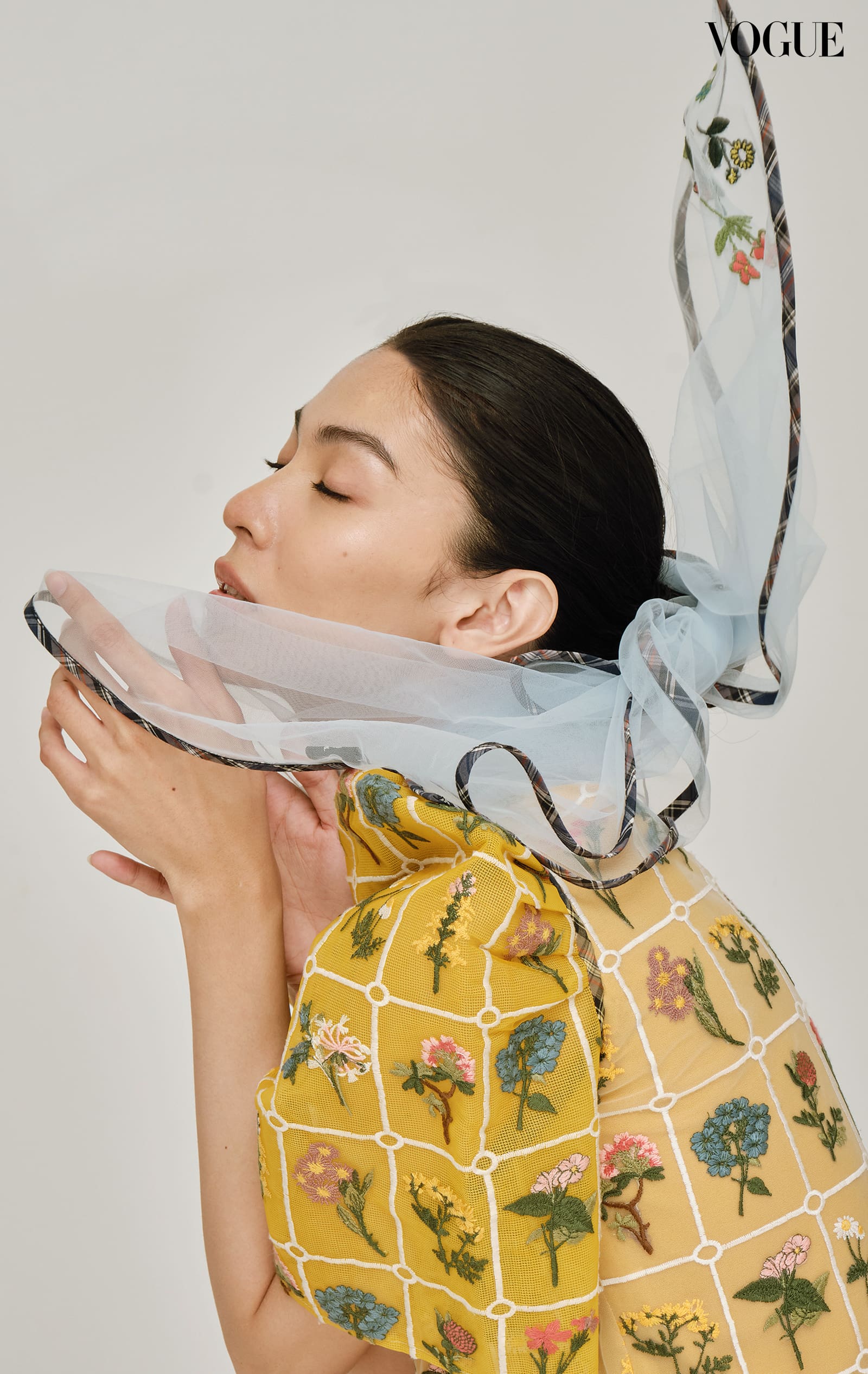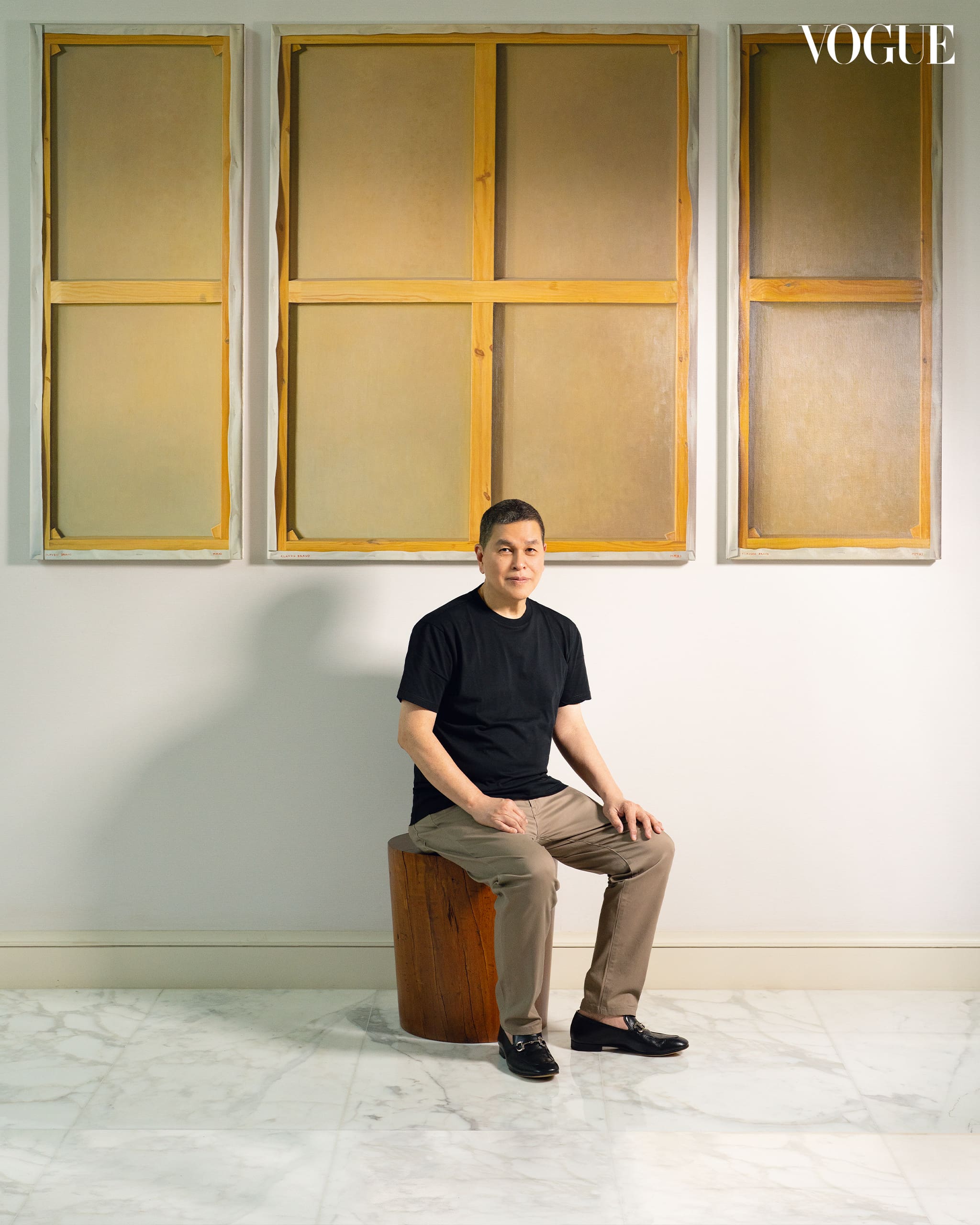Ben Chan. Shaira Luna
Ben Chan, the stalwart of Philippine retail, is keeping Filipiniana alive and determined to make local talent thrive.
If patriotism and fashion now seem likely bedfellows, one could credit this subtle and sustained current to the efforts of Ben Chan. He is now at the forefront of reviving Filipiniana—particularly the terno—and creating platforms for our very own creatives.
“I think my sense of nationalism and interest in Filipiniana can be traced back to the influence of my parents,” Chan, the founder and chairman of retail and food giant Suyen Corporation, says. “It is part of my family’s history and now, a personal advocacy.”
His parents, Lib Chan and Yin See, established Liwayway Gawgaw, a company that produced starch right after World War II. “This was a time of independence and a period of strong nationalist sentiment,” Chan recalls. Their brand of starch was used mainly for keeping some of the most essential Filipiniana pieces crisp through a process dubbed almirol.
With nationalism as his ethos, he founded Bench, then a single-store t-shirt brand in 1987. “I don’t know what kind of courage I had to go against the grain that even during the hype of international brands, we were then stamping the words ‘Born in Manila’ on our tags and printing ‘Made in the Philippines’ on our shirts,” he says.
Through the years, he’s worked with Filipino creatives, publishing books on pop culture, mounting fashion shows headlined by local talents, and providing much-needed support to creatives. All these, he continues to pursue to this day.
Against the grain
“I’m a very private person but I’ve accepted the fact that my work sometimes requires me to be a public figure,” he says. “In a way, my privacy helps me observe the world at my own pace, distill the noise, balance opinions and listen to myself more.”
When he first began, international fast fashion brands were taking up prime real estate in local malls with Filipino brands having to compete with global campaigns, with seemingly infinite marketing budgets, and a consumer’s aspiration for the imported and the branded.
When the second wave of globalization in the Philippines happened through e-commerce, it was a time of sink or swim for local brands. But Chan’s company flourished, as he had built his business to be a dynamic yet timeless brand.
“I am a businessman, but a consumer first,” Chan admits. “I know the value of money and what it means for someone who buys our shirts at Bench, gets a haircut from Fix Salon, or eats at Maisen.” Seeing things from the perspective of a customer helps Chan stay in touch with what consumers today actually do or want. Thankfully, he’s also in business over something he loves to do. “I still get excited and passionate about new things as much as I did back in 1987. In a way, this has helped me navigate our journey for over three decades.”
When fashion became deprioritized during the pandemic, Bench already had an established essentials line, featuring personal care products. Even as early as 2009, Chan would have sustainable pieces like bamboo fiber undergarments. “There are three key aspects that we believe [have] kept us relevant: product, brand experience, and science.” All these, while “never forgetting where we came from and always celebrating our being Filipino,” he adds.
Neighboring countries often sport batik and weaves like the songket even for daily activities while Filipinos avoided the terno and the barong, reserving them for special occasions. “Through the years, our local design community has addressed this question further and offered options on how to wear the terno as everyday wear and beyond formal events,” Chan tells Vogue Philippines.
From pushing it to evolve as separates and modernizing the butterfly sleeves to pair with shorts and even jeans, terno inspired pieces are now proving to be a versatile sartorial option. “At Bench, we offer the terno as a top, among other materials, in a practical denim fabric at a price point accessible to most,” Chan shares. “One can wear the terno on a regular day without question.”
Chan is also involved in mounting the Katutubo Pop-Up Market, a partnership with his long-time friend Mons Romulo. The periodic shopping event showcases local designers, brands, weavers, and artisans to introduce and sell their works to the public. Katutubo welcomes established designers like Pepito Albert, Randy Ortiz, and Rhett Eala while also giving a platform to newer brands and artisans like Tarte Tatin, Nina Inabel, Style Ana, and Abel PH.
“I saw in Ben his love and sincerity in wanting to help promote our culture and our country,” Romulo shares. “They say never do business with a friend for fear you will end up as enemies, but this was proven wrong with our partnership.” Romulo adds that Chan is always there as a mentor, ready to give advice, yet keen on letting her call the shots.
Noel Manapat, who has been working with Chan for two decades, echoes Romulo’s sentiments. The creative says balancing his dreams with prudence is one of Chan’s best qualities as an entrepreneur and artist. “For him, the quality of his paper bag is just as important as the embroidery of a shirt. He has that kind of personality who believes that if you will do something, make sure to do it well.”

Business of Fashion
Spotting and nurturing talent is among Chan’s passions. During Bench Fashion Week’s latest run, he invited five designers to showcase their work and collaborate with his brands. Among them was award-winning designer and TernoCon 2 mentor Lesley Mobo who shuttles between London and Manila.
Mobo admits that Chan’s work has always been an inspiration. When Chan asked him to collaborate on a Filipino collection he started during the pandemic, he swiftly agreed.
“It’s very rural because that’s partly where I come from,” Lesley says. “Similar to architecture, everyone is trying to veer away from rustic but I think that’s so beautiful,” he adds, sharing how they decided to throw a fiesta rather than the usual fashion show. Mobo, who has mastered the art of celebrating the rustic in an elevated manner, found his designs on jackets and casual wear bringing his designs to the wider clientele.
“We are in the business of fashion. Fashion is fueled by new ideas. It is for the benefit of the industry to provide a platform for emerging creatives, up-and-coming designers to nurture their talents, and build their businesses,” Chan says.
Looking ahead
Chan happily notes that even before the pandemic, people would seek locally-sourced and sustainably-made products. “There was already a paradigm shift in the mindset of the market to look for Filipino-made, Filipiniana-themed pieces,” he says. “This has also given rise to designers looking more inwards and inspired by their own regional heritage and materials. Suddenly, Filipiniana was accessible, made for all, and for all occasions.” The shift was more than welcome. Finally, people were seeing what Chan saw in the ’80s: the greatness in loving local.
Now with over 600 stores in the Philippines, the US, Middle East, and China, Bench has come a long way from being the single-store t-shirt brand it once was. “Trust your instincts. Think harder. Take risks,” is what Chan says when asked how his brand was able to both stay relevant and expand internationally over the years.
An avid traveler, Ben Chan often finds inspiration during his trips. From a garden in Tokyo to a key holder from a hotel or signage from a metro, his curiosity can be swiftly piqued. Endearing quirks like collecting stickers from his trips and round objects for luck are just some of the things he enjoys in private along with buying books and print magazines in a highly digitized world.
He counts Japan as one of his favorite destinations, where fashion to food presentation can be an art form and it’s not unusual to see a woman in a kimono walking in Mihara Yasuhiro. “I think that the more I travel, the more I feel like my love for country deepens. I know many of us feel the same way. We get the urge to aim higher, do better, to give more back.”
Chan continues to advocate for the local industry through his brands and projects, saying that it’s not always just about the products. It’s also about providing an experience for the clientele. “I think that projects such as TernoCon are examples of how we can share to Filipinos what we stand for,” he adds.
Thanks to Ben Chan, donning the terno is becoming more accessible, along with the t-shirts he started with. Now, it’s possible, even easy, to wear something Filipino on any type of day, for any activity or occasion. “To see one person in a terno is beautiful to see,” he says. “To see a roomful of people wearing Filipiniana is unforgettable.”
This story was originally published in Vogue Philippines’ December-January 2023 Issue, out now. Subscribe here.
